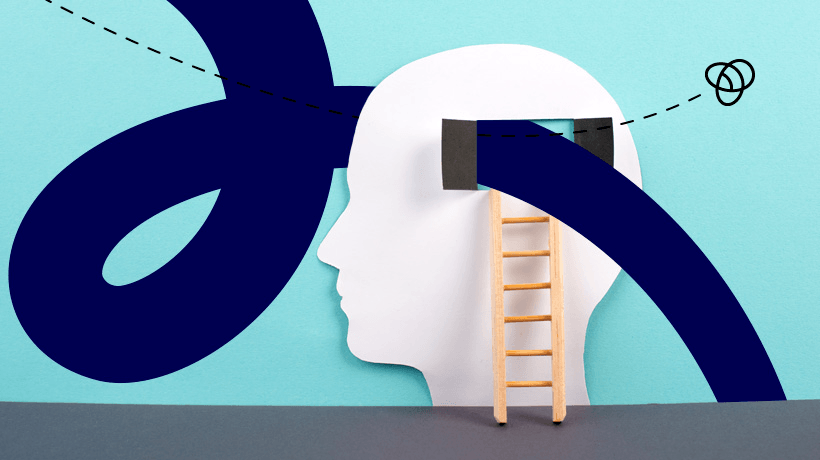Why Most Platforms Ignore The Science Of Memory
How do you make knowledge stay? That's what our client, a professional learning platform owner, wanted to solve. Their goal was simple: help learners retain knowledge that applies in real work. But they also saw a business advantage: a platform that truly builds skills keeps learners coming back and recommending it. During our research, I recalled Make It Stick by Brown, Roediger, and McDaniel, a book that explains why familiar study habits fail. That became our foundation. Then, we studied new research into the science of learning and how to apply it with AI, and compared modern platforms and found that most of them still miss these principles. While some modern tools apply them, nearly 80% of examined courses still follow the old path: watch, test, forget.
What Kills Real Learning
The Illusion Of Mastery
When something feels familiar, the mind relaxes. You reread a paragraph, recognize a concept, and it seems almost effortless. That sense of ease convinces you the material is learned, when in fact you've only grown comfortable with repetition.
The Learning Styles Myth
"I'm a visual learner" sounds convincing but lacks evidence. Studies show that matching content to preferred styles doesn't improve results. Yet many courses still rely on this idea, adding visuals or audio for each "type."
The Fixed Mindset Trap
Phrases like "I'm good at math" or "I'm bad at languages" carry a message that ability is fixed. When people believe intelligence is something they're born with, they tend to avoid what challenges them. Struggle feels like proof of limitation rather than a step toward progress.
What Real Knowledge Is
Remembering isn't the same as knowing. Many platforms track how much learners recall, not whether they can apply it. Real learning shows in transfer, using knowledge beyond the test, not repeating it by memory.
The Cognitive Science Of Learning, With AI Help
Retrieval Practice And Spaced Learning
People often talk about the learning curve, but ignore the forgetting curve. In fact, memory fades fast: after a day, we may remember only a fraction of what we learned. What truly strengthens memory is when knowledge is spaced over time and recalled with effort. Putting effort means making our brain work harder: retrieving, connecting, and reconstructing information rather than just recognizing it.
Like the learning curve, the forgetting curve is personal. It depends on memory strength, difficulty of the material, and even physiological state. However, most platforms deliver a one-time course but do little to combat this natural decline.
AI can automate and personalize both when and what to review. Adaptive algorithms analyze how learners perform and adjust review timing, question types, and difficulty. For example, an AI-powered micro-test and quiz creator can insert short prompts or flash reviews into courses, helping learners retain knowledge over time.
Interleaving And Varied Practice
Switching between topics and task types—a method known as interleaving—feels less comfortable at first but results in more flexible and durable knowledge. The constant shift forces your brain to compare, distinguish, and recall.
However, instructors and content creators rarely have the time to design such patterns. But this task can be delegated to AI systems. Unlike humans, algorithms can continuously track performance, detect patterns, and recommend when it's best to mix topics or revisit earlier material.
For example, an adaptive learning path feature can be added to an LMS. It automatically alternates between related subjects and reintroduces older topics just before they're forgotten.
Desirable Difficulties And Generation Effect
The term "desirable difficulties" describes learning conditions that intentionally make the process more effortful, but in a productive way. It's close to what we discussed earlier: real learning often comes with a certain degree of challenge. However, desirable difficulties also implies carefully adjusting the level of effort required to learn. The goal of this method is not to make learning frustrating, but to ensure that learners engage their memory or problem-solving skills.
A related concept is the generation effect: the tendency to remember information better when you generate it yourself. The challenge is that what feels "desirably difficult" to one learner might feel too easy or too overwhelming to another. The optimal difficulty level is highly individual.
Smart AI-driven tutoring systems and chatbots can create adaptive learning experiences that encourage learners to think before being shown the answer. By analyzing responses, these tools can detect when a learner is ready for a tougher question or when they need more support.
How To Stand Out By Delivering True Value In Digital Learning
Digital learning constantly balances two forces. Research shows that durable knowledge requires effort: retrieval, spacing, interleaving, and generation. Yet learners often prefer what feels quick and easy: short videos, progress bars, simple quizzes.
Cognitive design focuses on what actually works, such as scheduling reviews, mixing practice types, prompting learners to recall and apply knowledge. Doing this manually is slow, but AI can handle it. It results not only in just better learning. Companies that apply cognitive principles gain richer data—how forgetting happens, which feedback works, and how effort leads to mastery. These insights improve both learners and the system itself.
Still, few platforms use this approach. In professional training, it's even rarer: only 32% of recent LMS deployments include adaptive learning. And that's the business edge. Platforms that embed learning science and AI personalization aren't just teaching better; they're setting the next market standard.
We believe that the future of learning lies between effort and ease. And AI can help design learning that challenges without exhausting. If you want to evaluate how your LMS supports lasting learning, ask yourself:
- Do you test retrieval or only recognition?
- Is content revisited over time?
- Does the system respond to performance, not just completion?
- Is feedback explanatory, not only corrective?
- Do you mix topics and practice types?
- Are review intervals personalized?
If you answered "yes" to some questions, it means there's room to grow.




![The Science Of Learning: Bridging Theory And Practice For Modern Learning [eBook Launch]](https://cdn.elearningindustry.com/wp-content/uploads/2025/01/Science-Of-Learning-The-Connection-Between-Sciences-And-LD.jpg)



